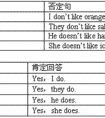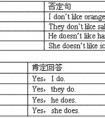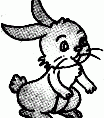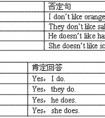按要求改写句子。1. This is the Palace Museum in Beijing. (变一般疑问句)________________________________________________________________________2. A train is s-五年级英语
题文
| 按要求改写句子。 |
| 1. This is the Palace Museum in Beijing. (变一般疑问句) ________________________________________________________________________ 2. A train is slow. An airplane is fast. (用比较级) ________________________________________________________________________ 3. We leave for China on February first in the afternoon. (对画线部分提问) ________________________________________________________________________ |
答案
|
1. Is this the Palace Museum in Beijing? |
据专家权威分析,试题“按要求改写句子。1. This is the Palace Museum in Beijing. (..”主要考查你对 一般疑问句,规则形容词的比较级,疑问副词,介词 等考点的理解。关于这些考点的“档案”如下:
一般疑问句规则形容词的比较级疑问副词介词
考点名称:一般疑问句
- 一般疑问句:
是疑问句的一种。它是以be动词,have或助动词、情态动词开头,用yes(是)或no(否)来回答的句子。
其结构是:系动词be/助动词/情态动词+主语+其他成分
一般疑问句的肯定形式为:
助动词+主语(+实义动词)。肯定答语用“yes+可定结构”。
一般疑问句的否定形式为:
助动词构成的缩写否定词+主语(+实义动词)。否定答语用“no+否定结构”。
例:
— Do you like this story-book? 你喜欢这本故事书吗?
— Yes, I do. 喜欢。/ No, I don’t. 不喜欢。
— Is he a student? 他是一名学生吗?
— Yes, he is. 是,他是。/ No, he isn’t. 不,他不是。 一般疑问句的改写:
一、含有be动词的一般疑问句,通常把be动词调到句首。例如:
陈述句:They are in the swimming pool.
一般疑问句:Are they in the swimming pool?
注意:一般疑问句句末要用“?”。
二、含有情态动词的一般疑问句(can, may...),把情态动词调到句首。例如:
陈述句:He can drive a car.
一般疑问句: Can he drive a car?
三、含有have的一般疑问句,have译为“有”。一般疑问句式有两种形式:
1.把have/has调到句首。例如:
陈述句:Tommy has a computer.
一般疑问句:Has Tommy/he a computer?
2.加助动词do/does,第三人称单数用does,其他人称用do。其句型为:Do/Does + 主语 + have...?
例如上句可变为: Does Tommy have a computer?四、一般动词的一般疑问句,也要借助助动词do/does,第三人称单数用does,其余人称用do。
其句型为:Do/Does + 主语 + 动词原形+其它?
陈述句:Amy speaks English.
一般疑问句:Does Amy speak English?一般疑问句的回答:
首先要有人称的改变。当主语为名词时,在答语中要改成其相应的代词。
另外,答语有两种,肯定的回答(用yes)和否定的回答(用no),否定式常用缩写形式。
现在还是让我们分句型一一说明。一、一般疑问句含be动词时,用be动词回答,句末用句号。例如:
-Is Mary your sister?
-Yes, she is. / No, she isn’t.(缩写)二、一般疑问句含有情态动词(can, may, should等)时,用情态动词回答。例如:
-May I come in?
-Yes, you may. / No, you can’t.三、一般疑问句含有have(译为“有”)时,有两种回答方式。
1.直接用have/has回答。
例如:
-Have they any pictures?
-Yes, they have. / No, they haven’t.
2.用助动词do/does回答。
例如:
-Does Millie smoke?
-Yes, she does. / No, she doesn’t.四、一般动词的一般疑问句回答时也用助动词。
例如:
-Do the workers live in London?
-Yes, they do. / No, they don’t.
考点名称:规则形容词的比较级
- 当我们需要对事物作出比较时,需要用到比较级。
比较级的句子结构通常是:
什么 + 动词be (am , is , are ) + 形容词比较级 + than(比)+ 什么 ,意为:“比……更……”。 如:
I’m taller and heavier than you. (我比你更高和更重。)
An elephant is bigger than a tiger. (一只大象比一只老虎更大。) - 形容词的比较级变化规则:
形容词的比较级是在形容词的基础上变化而来的,规则形容词的比较级变化规则是:
① 一般的直接在词尾加er ,如 tall - taller , strong - stronger ,
② 以e结尾的,直接加r ,如 fine – finer ,
③ 以辅音字母加y结尾的,先改y为i再加er,如funny - funnier
④ 双写最后的字母再加er,如big – bigger, thin – thinner ,
hot – hotter
下表举例列举一些形容词的原级和比较级。
原级 比较级 long longer large larger dry drier big bigger hot hotter
考点名称:疑问副词
- 疑问副词:
用来引导特殊疑问句,表示时间,地点,方式,原因等,常见的有:when,where,how,why等。
分类:
时间副词:now, then, yesterday, always, already, soon
地点副词:here, home, upstairs, nowhere, above, near, beyond
方式副词:多数是形容词加上ly构成的,和一些well, fast, quick, slow, hard, alone, straight, wide
在加词尾ly时要注意:
(1)辅音+le:simple→simply, gentle→gently,
(2)以ic结尾的词:classic→classical但是public→publicly
(3)以辅音读音是[i]的y结尾的词:easy→easily
(4)特例:full→fully, whole→wholly, true→truly
程度副词,连接副词,关系副词
much, enough, quite, hardly, almost, deeply
疑问副词连接副词,关系副词:
how,who,where - 疑问副词在句中的位置及用法举例:
由于疑问副词后接疑问句,因此这些副词一般都位于句首。例如:
How do you go to school? 你怎么去上学?
Why do you dislike the game? 为什么你不喜欢这个游戏? - 疑问代词和疑问副词区别:
1. 疑问代词做对陈述句的主语,宾语或定语提问,即做句子的主语,宾语或定语, 如:
what, who/ whom, whose.
eg. Who is talking ?
What can you see?
Whose shirt is this?
2.疑问副词对时间,地点,方式等状语提问,如:
when, where, how 等.
eg. When is your birthday?
Where are you going?
How do you know?
考点名称:介词
- 介词:
是用来表示它后面的名词(代词)或起名词作用的短语、从句与句中其他成分之间的关系。
- 最新内容
- 相关内容
- 网友推荐
- 图文推荐
| [家长教育] 孩子为什么会和父母感情疏离? (2019-07-14) |
| [教师分享] 给远方姐姐的一封信 (2018-11-07) |
| [教师分享] 伸缩门 (2018-11-07) |
| [教师分享] 回家乡 (2018-11-07) |
| [教师分享] 是风味也是人间 (2018-11-07) |
| [教师分享] 一句格言的启示 (2018-11-07) |
| [教师分享] 无规矩不成方圆 (2018-11-07) |
| [教师分享] 第十届全国教育名家论坛有感(二) (2018-11-07) |
| [教师分享] 贪玩的小狗 (2018-11-07) |
| [教师分享] 未命名文章 (2018-11-07) |





![____ it got four wheels?[ ]A. Have B. There C. Has-五年级英语](http://www.00-edu.com/d/file/ks/4/1/65/2019-08-31/small2ca0aeba76320ba6f81e40fe83a0e8111567199443.png)
